Teacher Books & Materials
My books, articles, and unit plans offer busy educators practical solutions to literacy problems, thought provoking ideas on teaching, and classroom materials that engage learners and lead to more reading, writing, and spelling.
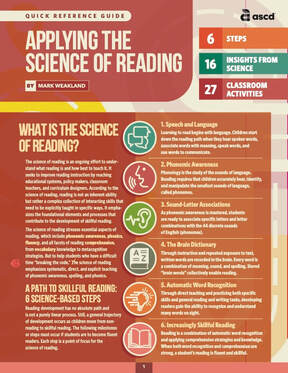
NEW from ASCD!
Applying the Science of Reading Quick Reference Guide
This compact and easy to understand foldout explains the ins and outs of the science of reading, the neuroscience behind it, and how to incorporate it in your elementary classroom.
The science of reading is an ongoing effort to understand what reading is and how best to teach it systemically, directly, and explicitly. Reading proficiency is attainable for any student, especially when teachers help them develop the six foundational skills explained in this guide:
- Speech and language
- Phonemic awareness
- Sound-letter associations
- The brain dictionary
- Automatic word recognition
- Increasingly skillful reading
Applying the Science of Reading effectively breaks down insights from neuroscience research and suggests related activities for every classroom, helping classroom teachers teach activities and strategies that help all students become accomplished and capable readers.
Applying the Science of Reading Quick Reference Guide
This compact and easy to understand foldout explains the ins and outs of the science of reading, the neuroscience behind it, and how to incorporate it in your elementary classroom.
The science of reading is an ongoing effort to understand what reading is and how best to teach it systemically, directly, and explicitly. Reading proficiency is attainable for any student, especially when teachers help them develop the six foundational skills explained in this guide:
- Speech and language
- Phonemic awareness
- Sound-letter associations
- The brain dictionary
- Automatic word recognition
- Increasingly skillful reading
Applying the Science of Reading effectively breaks down insights from neuroscience research and suggests related activities for every classroom, helping classroom teachers teach activities and strategies that help all students become accomplished and capable readers.
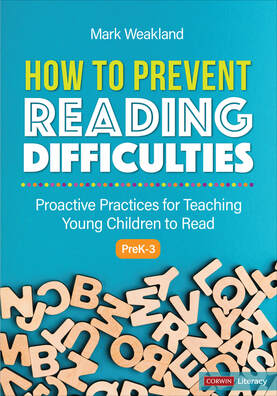
How To Prevent Reading Difficulties, PreK-3:
Proactive Practices for Teaching Young Children To Read
"The science of reading meets the art of teaching readers." Built upon decades of evidence and years of experience, this book shows teachers how the brain learns to read and how that understanding can be applied to Tier 1 instruction. Includes dozens of effective and practice activities, strategies, and routines in the areas of language comprehension, phonology, orthography, and the extended reading of all types of text.
“This book is so much more than a “few great strategies to try on.” Rather, it explains the science of how our reading brains work, so that we acknowledge all that the brain does when making sense of text. How to Prevent Reading Difficulties can benefit both new and seasoned practitioners in two ways: First, these powerful strategies detail specific yet practical activities, routines, and techniques that teachers can use to teach all children the basics of reading, and second, because these practices focus on establishing a strong foundation, they also help teachers to prevent reading difficulties through strong Tier 1 instruction.” —Hilda Martinez NBCT, RTI Coordinator, 2020 San Diego County Teacher of the Year
“From brain research to building better readers, Mark Weakland’s How to Prevent Reading Difficulties, Grades PreK–3 provides a very readable and actionable approach to overcoming reading difficulties in young children. This is definitely a book worth reading and having on hand as a guide for developing reading instruction that works.”
—Timothy Rasinski Professor of Literacy Education, Kent State University
“In How to Prevent Reading Difficulties, Mark Weakland offers a wealth of practical instructional activities and routines to maximize student learning in phonological awareness, phonics, spelling, vocabulary, comprehension, and more. This resource is grounded in the latest research drawn from multiple sciences examining how children learn to read. It’s a valuable addition to any teacher’s bookshelf.” —Wiley Blevins Author, A Fresh Look at Phonics
Proactive Practices for Teaching Young Children To Read
"The science of reading meets the art of teaching readers." Built upon decades of evidence and years of experience, this book shows teachers how the brain learns to read and how that understanding can be applied to Tier 1 instruction. Includes dozens of effective and practice activities, strategies, and routines in the areas of language comprehension, phonology, orthography, and the extended reading of all types of text.
“This book is so much more than a “few great strategies to try on.” Rather, it explains the science of how our reading brains work, so that we acknowledge all that the brain does when making sense of text. How to Prevent Reading Difficulties can benefit both new and seasoned practitioners in two ways: First, these powerful strategies detail specific yet practical activities, routines, and techniques that teachers can use to teach all children the basics of reading, and second, because these practices focus on establishing a strong foundation, they also help teachers to prevent reading difficulties through strong Tier 1 instruction.” —Hilda Martinez NBCT, RTI Coordinator, 2020 San Diego County Teacher of the Year
“From brain research to building better readers, Mark Weakland’s How to Prevent Reading Difficulties, Grades PreK–3 provides a very readable and actionable approach to overcoming reading difficulties in young children. This is definitely a book worth reading and having on hand as a guide for developing reading instruction that works.”
—Timothy Rasinski Professor of Literacy Education, Kent State University
“In How to Prevent Reading Difficulties, Mark Weakland offers a wealth of practical instructional activities and routines to maximize student learning in phonological awareness, phonics, spelling, vocabulary, comprehension, and more. This resource is grounded in the latest research drawn from multiple sciences examining how children learn to read. It’s a valuable addition to any teacher’s bookshelf.” —Wiley Blevins Author, A Fresh Look at Phonics
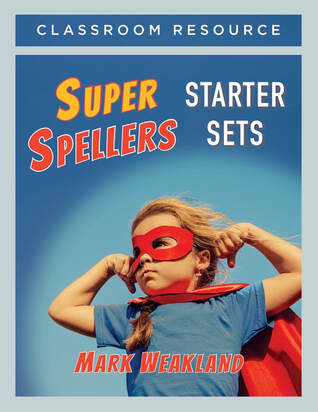
Super Spellers Starter Sets - a spelling resource book
Because spelling is for reading, it is important to teach spelling, not merely assign it. With Super Spellers Starter Sets, you have everything you need to bring to life the wisdom of Super Spellers: Seven Steps to Transforming Your Spelling Instruction. Building on his research-based approach, Mark Weakland provides practical, hands-on tools to create spelling centers; teach spelling strategies that help children solve spelling challenges; and introduce everything from short vowel patterns to multi-syllable Greek- and Latin-based words.This teacher resource provides a wealth of material, all adaptable to match the needs of your students:
Because spelling is for reading, it is important to teach spelling, not merely assign it. With Super Spellers Starter Sets, you have everything you need to bring to life the wisdom of Super Spellers: Seven Steps to Transforming Your Spelling Instruction. Building on his research-based approach, Mark Weakland provides practical, hands-on tools to create spelling centers; teach spelling strategies that help children solve spelling challenges; and introduce everything from short vowel patterns to multi-syllable Greek- and Latin-based words.This teacher resource provides a wealth of material, all adaptable to match the needs of your students:
- - Seven spelling strategy lessons every student needs to know
- - More than 20 lessons for different grade levels
- - Pointers, differentiated word lists, sorting masters and correlating word ladders
- -Six must-have spelling centers for nurturing independent practice
- - A resource-rich appendix
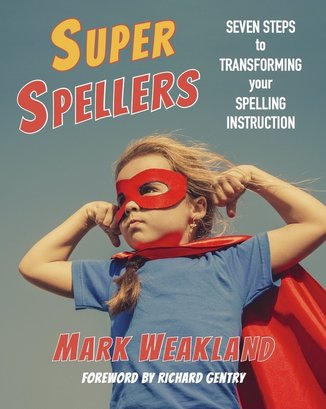
Super Spellers
Spelling is for reading (and writing) and one-size-fits-all "memorize and move on" spelling instruction does little to improve reading and writing skills, especially for students who struggle. Super Spellers encourages teachers to transform their spelling instruction by understanding that spelling knowledge is essential for reading achievement, assessing spelling knowledge in more immediate and meaningful ways, building powerful word lists, teaching strategies that help children spell unknown words, and engaging in simple yet effective classroom activities and instructional methods that enable students to build spelling skills, as well as become better readers and writers.
" Super Spellers is the kind of staff development book that surfaces only a few times in a decade—a book that brilliantly, concisely, and concretely connects the latest research to best practice. It’s an enjoyable read that will give you immediate ideas to take back to your classroom. You know how you have a few books that you come back to over and over? This is one of those. I predict that this book will be an important contribution to reading education today and for decades to come."
- From the forward by researcher, author, and educator Dr. J. Richard Gentry, PhD.
Spelling is for reading (and writing) and one-size-fits-all "memorize and move on" spelling instruction does little to improve reading and writing skills, especially for students who struggle. Super Spellers encourages teachers to transform their spelling instruction by understanding that spelling knowledge is essential for reading achievement, assessing spelling knowledge in more immediate and meaningful ways, building powerful word lists, teaching strategies that help children spell unknown words, and engaging in simple yet effective classroom activities and instructional methods that enable students to build spelling skills, as well as become better readers and writers.
" Super Spellers is the kind of staff development book that surfaces only a few times in a decade—a book that brilliantly, concisely, and concretely connects the latest research to best practice. It’s an enjoyable read that will give you immediate ideas to take back to your classroom. You know how you have a few books that you come back to over and over? This is one of those. I predict that this book will be an important contribution to reading education today and for decades to come."
- From the forward by researcher, author, and educator Dr. J. Richard Gentry, PhD.
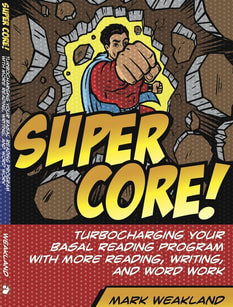
SUPER CORE! Turbocharging Your Basal Reading Program
Super Core does not ask you to abandon your core reading program. Instead, it demonstrates how to make changes in your instruction, narrow the scope of what you teach, decrease the time your students spend in workbooks, and increase the time they spend on reading and writing for real purposes—to turbocharge your teaching and your students’ learning.
Super Core shows you how to create a more effective and engaging reading program by subtracting a few components, adding key research-based instructional practices and formative assessments, and becoming mindful of fundamental content and instructional values. Each chapter guides you through teaching techniques that can help you gradually rely less on the basal reader and more on your own knowledge and experience as an educator. Specifically, this book does the following:
Super Core does not ask you to abandon your core reading program. Instead, it demonstrates how to make changes in your instruction, narrow the scope of what you teach, decrease the time your students spend in workbooks, and increase the time they spend on reading and writing for real purposes—to turbocharge your teaching and your students’ learning.
Super Core shows you how to create a more effective and engaging reading program by subtracting a few components, adding key research-based instructional practices and formative assessments, and becoming mindful of fundamental content and instructional values. Each chapter guides you through teaching techniques that can help you gradually rely less on the basal reader and more on your own knowledge and experience as an educator. Specifically, this book does the following:
- Calls attention to specific ineffective components of core reading programs—and shows you how to fix them;
- Describes how to streamline your literacy teaching to be more efficient and purposeful;
- Provides effective, easy-to-use vocabulary, fluency, phonic, and comprehension activities, materials, and routines that take the place of ineffective and missing components of your core reading program.
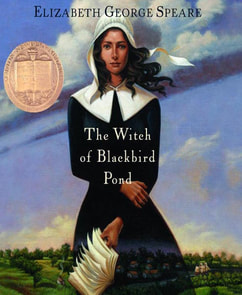
The Witch of Blackbird Pond Literature Unit Plan is a highly rated, best-selling unit plan available through Teachers Pay Teachers. It consists of ten core 60 to 70 minute lessons and three supplemental lessons that make use of an Exploration Board.
The purpose of this integrated unit is to develop language arts skills through multiple patterns of practice. Students working through this unit will demonstrate oral reading fluency, use metacognitive reading strategies that lead to deeper levels of thinking and greater levels of text comprehension, write in order to communicate ideas, opinions and information pertaining to the story, and speak and listen to one another in small and large group settings.
Included are comprehension questions, homework assignments, ideas for providing enrichment, a test, assessment options, project-based learning options with rubrics, graphic organizers, state standards, lesson objectives suitable for special education students, worksheets, vocabulary lists, and much more!
The purpose of this integrated unit is to develop language arts skills through multiple patterns of practice. Students working through this unit will demonstrate oral reading fluency, use metacognitive reading strategies that lead to deeper levels of thinking and greater levels of text comprehension, write in order to communicate ideas, opinions and information pertaining to the story, and speak and listen to one another in small and large group settings.
Included are comprehension questions, homework assignments, ideas for providing enrichment, a test, assessment options, project-based learning options with rubrics, graphic organizers, state standards, lesson objectives suitable for special education students, worksheets, vocabulary lists, and much more!
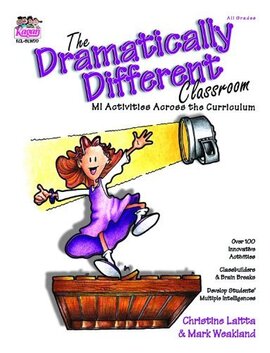
Awaken the Einsteins, Hepburns, and Shakespeares within your class! Multiple intelligences theory teaches us that students have different interests, different abilities, and learn differently. Co-author Christine Laitta and I offer 100 plus activities that span the intelligences and release the hidden abilities in students, especially those who learn through movement and music.
You'll love these innovative ways to present your everyday curriculum including: Character Monologues, Wax Museum, Math Theater, and Soaring through the Solar System. Your mathematics, language arts, science and health, and social studies come alive through creative dramatics. Learning is more engaging for all students, and definitely more memorable. Includes terrific classbuilders and energizing brain breaks.
http://www.kaganonline.com/catalog/multiple_intelligences_2.php#BLWDD
You'll love these innovative ways to present your everyday curriculum including: Character Monologues, Wax Museum, Math Theater, and Soaring through the Solar System. Your mathematics, language arts, science and health, and social studies come alive through creative dramatics. Learning is more engaging for all students, and definitely more memorable. Includes terrific classbuilders and energizing brain breaks.
http://www.kaganonline.com/catalog/multiple_intelligences_2.php#BLWDD